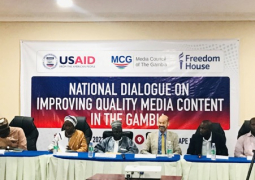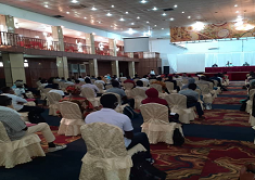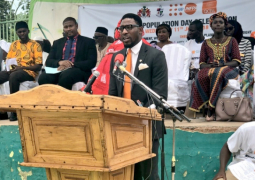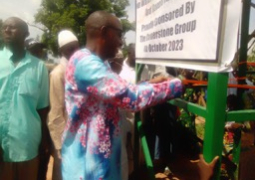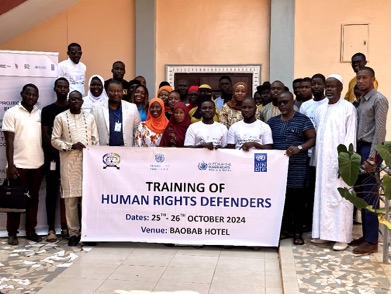
The training held at Baobab Hotel in Bijilo from 25th - 26th October 2024, was aimed at building the capacity of grassroots human rights defenders with the requisite skills and knowledge in advancing human rights in the country.
Welcoming the gathering, Nfamara Jawneh, Executive Director of Beakanyang, congratulated participants for being shortlisted from a pool of over 100 applicants.
He thanked UNDP, Office of the High Commissioner for Human Rights and UN Peacebuilding Fund and TANGO for supporting this important activity.
"The objective of this training is to build the capacities of human rights defenders and equip them with skills to be able to do their work effectively,” he said.
In his conclusion, Beakanyang Director used the opportunity to urge government to protect human rights defenders.
He equally called for more solidarity and collaboration among human rights defenders and human rights organisations in the country.
Emanuel Joof, chairman of National Human Rights Commission (NHRC), welcomed the initiative of Beakanyang to train and establish the Network of Human Rights Defenders.
While pledging his office’s support for the Human Rights Defenders, he lauded the NGO for its steadfast and continuous commitment to advancing human rights.
Joof commended the group for their initiative, describing them as a leading and proactive grassroots human rights organisation in the country.
Speaking on behalf of the funding partners of the event, Ms. Judith Akot Brenda Order from the Post-TRRC Project Office of the Office of the High Commissioner for Human Rights, described the training as very important.
"The post TRRC project jointly implemented by the office of the High Commissioner of Human Rights and UNDP with UN peacebuilding Fund is pleased to be supporting this event. The project is assisting the government and stakeholders to implement and monitor the post TRR recommendations and support the work of Human Rights defenders,” she said.
“In contexts undergoing transition, human rights defenders can focus on ending impunity for violations and work to strengthen the State’s capacity to prosecute perpetrators of violations, for example by providing human rights training for prosecutors, judges and the police. They can work with state institutions to support the recommendations of Truth Commissions as is the case in the Gambia,” she said.
She also lamented that despite the critical work of human rights defenders during peaceful and fragile situations; they are at time under grave threat.
“According to data gathered by Office of the High Commissioner for Human Rights, in 2023, 320 human rights defenders, journalists and trade unionists in 40 countries were killed,” she divulged.
She added that with autocratic tendencies on the rise, criticism is criminalised and civic space is stifled and shrunk in some countries, under vaguely defined threats to national security. Legitimate protests are curbed with force, and places for people to discuss and participate in decisions are shut down.
“In this context, it is critical to ensure that human rights defenders are safe and that they have inclusive environments to speak up and take part in decisions. A human rights defender’s network has the capacity to promote the very notion of HRDs, to raise awareness about human rights among all stakeholders, and to foster information exchange for better protection of human rights defenders.”


